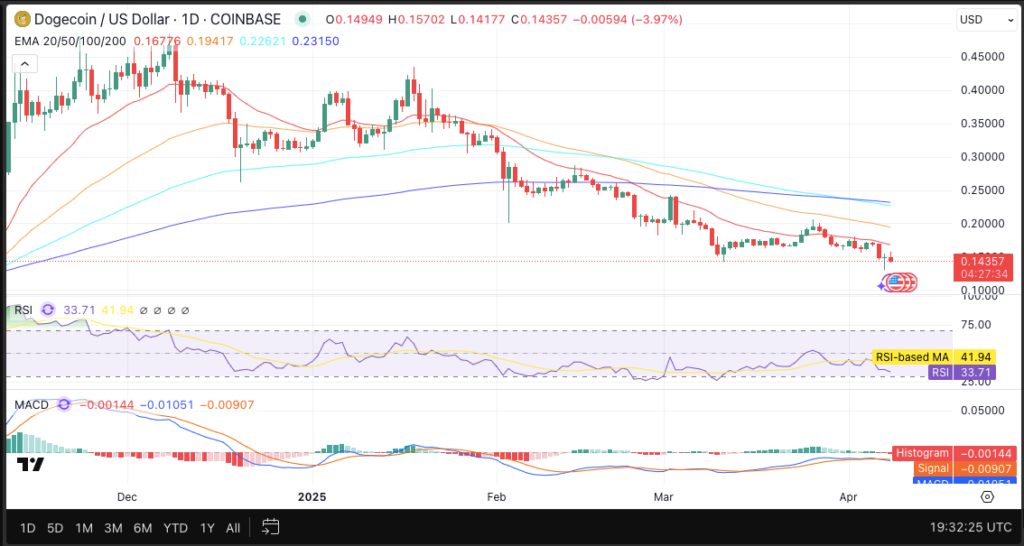Key Insights :
- Dogecoin surged from $0.11 to $0.46 in late 2024, sparking hopes of a $1 price target in 2025.
- Analysts believe Dogecoin’s unlimited supply limits its potential to sustain high prices over time.
- Long-term holders reportedly sell during rallies, causing repeated price drops and failed breakouts.
Dogecoin (DOGE) price recorded an impressive surge during the final quarter of 2024. The memecoin rose from $0.11 to $0.46.
This rally sparked fresh optimism across the DOGE community, with renewed hopes of reaching the much-anticipated $1 mark in 2025. However, as the new year unfolds, strong headwinds and unfavorable conditions suggest the path to $1 remains uncertain.
DOGE Price Gains Momentum with ETF Prospects & Real-World Adoption
The recent DOGE price rally injected enthusiasm into the Dogecoin community. Many expected stronger upward momentum in early 2025.
Investors saw rising application numbers from asset managers seeking to launch spot DOGE exchange-traded funds as a positive market indicator. An approved fund could boost institutional involvement, resulting in widespread product adoption.
Crypto regulation is a primary element affecting how long it takes for ETF approval to be granted. Abnormal market predictions on Polymarket showed a 69% chance for the SEC to approve a DOGE ETF during 2025.
Dogecoin is gradually gaining traction in retail, with companies like Tesla and Twitch accepting it for payments. Of course, more firms adopting DOGE as a payment method will improve the coin’s utility.
The growth of actual-world adoption will lower market instability. On the other hand, it would offer better support for increasing price values.
Dogecoin Faces Challenges on Path Upward
Despite the renewed optimism, several analysts argue that DOGE price faces fundamental hurdles that could prevent it from reaching $1. Dogecoin’s unlimited supply diminishes its long-term value potential. In contrast, Bitcoin’s capped supply makes it more appealing to investors.
Numerous market analysts note that Dogecoin’s inflationary mechanism consistently pushes tokens into the market for sale. Long-time holders who purchased Dogecoin at bargain prices enter market trades at every price increase.
The holders who acquired DOGE at its early price points tend to cash out when the value increases. This triggered price declines and caused the price to fail to break past resistance levels.
DOGE has encountered barriers to price sustainability when facing resistance zones. This restricted its ability to move upwards. Regulatory frameworks play a significant role in shaping market dynamics.
Their controlling measures particularly influence the performance of meme coins like DOGE. Due to undefined regulatory boundaries, high regulatory vigilance prevents institutional investors from entering meme-based assets.
Bearish Technicals Reinforce Analyst Warnings on DOGE’s Short-Term Path
The 24-hour technical analysis supported the bearish sentiment expressed by many market experts. This added to concerns over DOGE price near-term prospects.
Dogecoin displayed continued falling momentum. The token dropped over 4% to reach a price of $0.1436 during the latest daily market session.
The market activity demonstrated weakness. This weakness came into play due to DOGE price remaining under all main exponential moving averages. Market data showed that all significant exponential moving averages operate above the current market position.
The EMA system demonstrated an established downward trend. It required major momentum changes for market recovery. Traders view this chart configuration as a signal of upcoming market shifts. It suggests aggressive sellers might dominate the next trading period.

Both the RSI together with the MACD displayed negative market sentiment. At press time, the RSI showed weak buying interest because its value of 33.71 indicated oversold conditions.
The MACD line demonstrated negative short-term bullish signals. This is because it remained beneath its signal line.
Musk’s Silence & Tariff Tensions Add More Pressure to DOGE Price
The absence of Elon Musk’s vocal support for Dogecoin has also weighed heavily on investor sentiment in recent months. Previously, Musk’s comments often triggered significant DOGE price spikes, acting as a catalyst for rallies.
Many retail investors demonstrate decreased investor interest due to Musk’s ongoing silence about Dogecoin. Some traders now argue that Musk’s lack of public endorsement may have permanently slowed Dogecoin’s mainstream momentum.
According to previous reports, Musk’s limited involvement with the Dogecoin Foundation has also contributed to declining interest. The lack of influencer support means DOGE has lost its earlier advantages from the same level of influencer backing.
